How to Recognize Early Signs of Dental Problems in Chinchillas
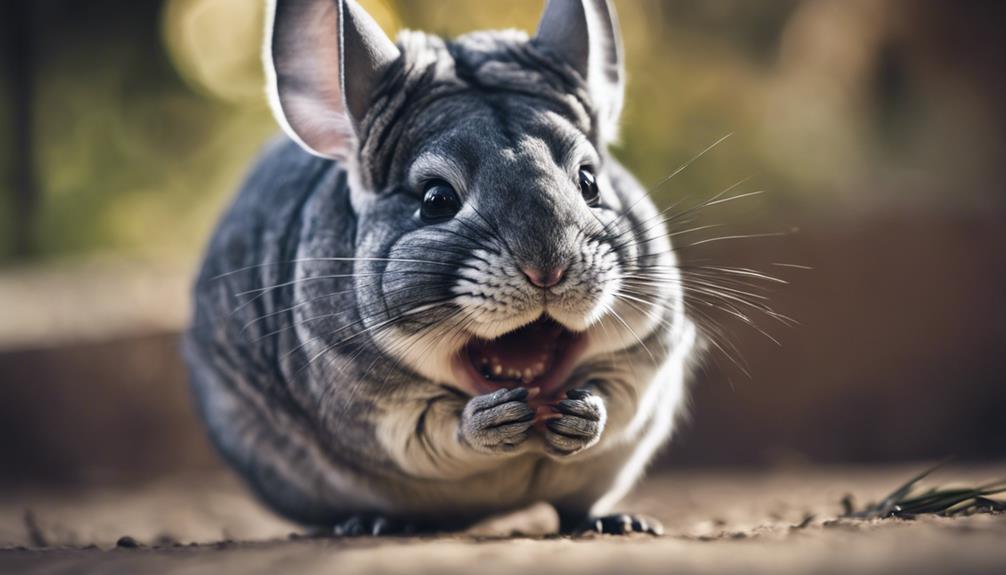
Early signs of dental problems in chinchillas can be subtle and easily overlooked. However, being vigilant and observant can help you spot them early for better health outcomes for your pet. One key indicator is changes in behavior, such as reduced appetite, drooling, or difficulty eating. Additionally, pay attention to any changes in your chinchilla's appearance, like weight loss, messy fur around the mouth, or visibly overgrown teeth. Regular veterinary check-ups and a proper diet can also help prevent and detect dental issues in chinchillas. Remember, early detection and intervention are crucial in managing dental problems in chinchillas.
Importance of Dental Health
Maintaining proper dental health is crucial for the overall well-being of chinchillas. Dental hygiene plays a significant role in preventing potential issues that can affect a chinchilla's health. Regular checkups are essential to identify any dental problems early on. By incorporating preventive measures into a chinchilla's care routine, such as providing chew toys and a balanced diet, owners can help promote good dental health.
Prevention is key when it comes to dental care for chinchillas. Owners should be vigilant in observing their chinchilla's eating habits and looking out for signs of dental problems, such as difficulty chewing or drooling. If any issues are detected, prompt treatment by a veterinarian specializing in exotic animals is crucial. Dental problems left untreated can lead to more severe health issues, affecting the chinchilla's well-being and quality of life. Therefore, regular dental checkups and timely treatment are imperative in ensuring the overall health and happiness of these adorable pets.
Normal Chinchilla Behavior

Chinchillas are crepuscular animals, meaning they're most active during dawn and dusk. Understanding their behavior patterns can help owners recognize potential issues early on.
Observing their eating and drinking habits is crucial in maintaining their overall health and well-being.
Behavior Patterns
Displaying various behaviors, chinchillas exhibit distinctive patterns that can help owners understand their normal behavior. Chinchillas are known to be active and curious creatures, often seen hopping and exploring their environment. They've a natural inclination to chew on objects to maintain their dental hygiene. Owners should observe their chinchilla's eating habits and ensure they've access to chew toys to prevent dental pain caused by overgrown teeth.
Chinchillas also enjoy dust baths to keep their fur clean and healthy. Additionally, these small mammals are crepuscular, meaning they're most active during dawn and dusk. Understanding these behavior patterns can aid owners in providing a suitable environment for their chinchilla's physical and mental well-being.
Eating and Drinking
Understanding the dietary habits of chinchillas is crucial for ensuring their overall well-being and health. When it comes to eating and drinking, chinchillas exhibit specific behaviors that can signal their dental health status.
- Chinchillas are herbivores and require a diet high in roughage to maintain healthy teeth.
- Monitoring their chewing patterns can help detect any signs of dental issues early on.
- Ensuring they have access to fresh hay and clean water is essential for preventing dental problems.
Changes in Eating Habits
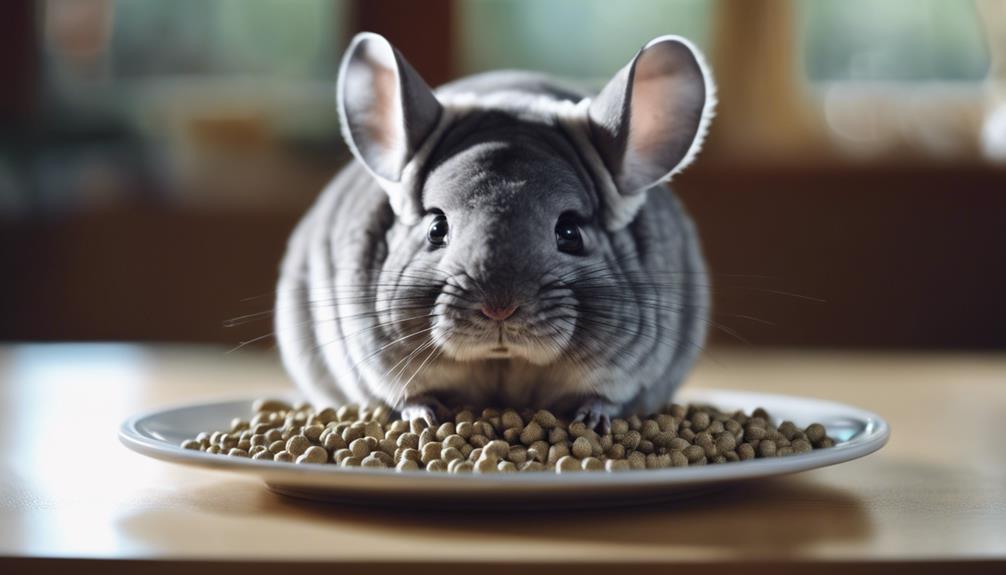
How can you determine if your chinchilla is experiencing changes in its eating habits? Chinchillas typically have specific eating preferences, so any deviation from their usual behavior could indicate underlying issues. Dental discomfort is a common reason for changes in eating habits in chinchillas. If you notice your chinchilla avoiding certain foods it used to enjoy, eating less, or struggling to chew, it may be experiencing dental problems. Dental issues, such as overgrown teeth or misalignments, can cause pain and difficulty while eating, leading to changes in food consumption patterns.
To monitor your chinchilla's eating habits effectively, keep a close eye on its food intake. If you observe a sudden decrease in the amount of food your chinchilla eats or notice it taking longer to finish meals, it could signal an underlying problem. Additionally, pay attention to any signs of discomfort while chewing, such as pawing at the mouth or dropping food frequently. These subtle changes in eating habits can provide valuable clues about your chinchilla's dental health.
Drooling or Wet Chin
If you notice your chinchilla's chin appearing wet or observe drooling, it could indicate potential dental issues that require prompt attention. Chin drooling in chinchillas can be a sign of underlying problems, often related to dental health. Here are a few key points to consider:
- Dental Examination: Schedule a thorough dental examination with a veterinarian who specializes in exotic pets. They can identify any dental issues causing the drooling and provide appropriate treatment.
- Prevention: Ensure your chinchilla has a proper diet that includes hay to help wear down their continuously growing teeth. Regular dental check-ups can help catch issues early and prevent drooling from occurring.
- Chin Drooling Treatment: Treatment for drooling in chinchillas may include dental procedures to correct overgrown teeth, abscess drainage, or providing pain relief. It's crucial to follow your vet's recommendations for at-home care to support your chinchilla's recovery.
Being vigilant about your chinchilla's dental health can help prevent more severe issues down the line.
Weight Loss
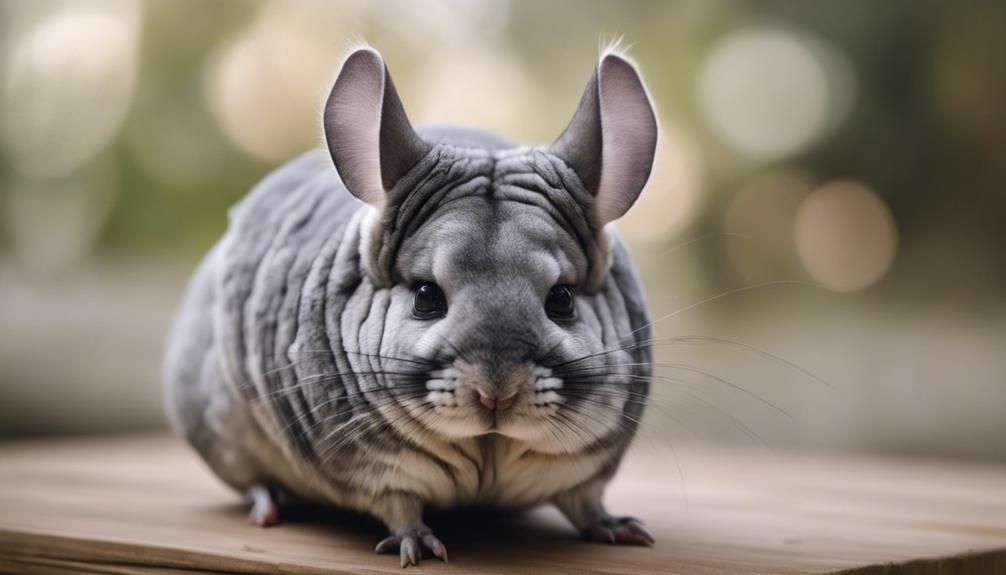
Weight loss in chinchillas can be indicative of underlying health issues that require prompt attention from a veterinarian specializing in exotic pets. It's essential to monitor your chinchilla's weight regularly as sudden or unexplained weight loss can signal dental problems. Chinchillas with dental issues may struggle to eat due to pain or difficulty chewing, leading to weight loss. To prevent weight loss linked to dental problems, ensure regular dental checkups to address any issues promptly.
Maintaining good dental hygiene is crucial for chinchillas' overall health. Providing a proper chinchilla diet that includes high-fiber hay and limited pellets can help manage weight and promote dental health. Avoid sugary treats and opt for chew toys that aid in wearing down teeth naturally. If weight loss is noticed, consult with a veterinarian experienced in treating chinchillas to determine the underlying cause and appropriate treatment. Early intervention can prevent further complications and ensure your chinchilla's well-being.
Eye or Nasal Discharge
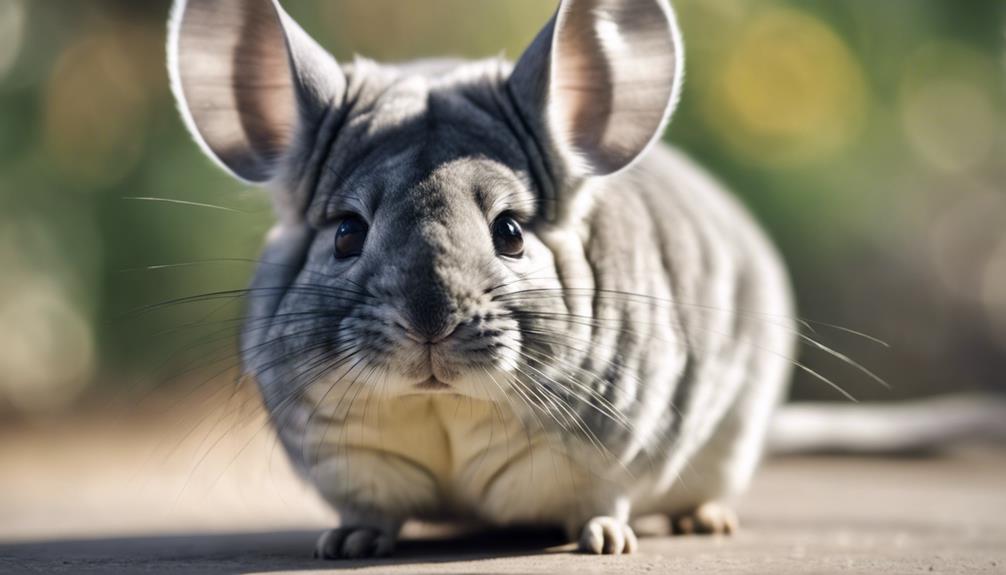
Chinchillas with dental issues may exhibit signs of eye or nasal discharge.
Watery eye discharge and persistent nasal discharge are common symptoms that can indicate underlying dental problems.
These issues should be promptly addressed by a veterinarian to prevent further complications.
Watery Eye Discharge
Excessive watery discharge from the eyes or nose in chinchillas may indicate an underlying health issue that requires prompt veterinary attention. When it comes to watery eye discharge in chinchillas, it's essential to be aware of the following:
- Observation: Watch for any changes in the consistency or color of the discharge.
- Behavioral Cues: Note if the chinchilla is rubbing its eyes frequently or showing signs of discomfort.
- Professional Evaluation: Seek a veterinarian experienced in exotic animals for a thorough examination and appropriate treatment.
Early detection and intervention are crucial in addressing potential dental problems that could be causing watery eyes in chinchillas.
Persistent Nasal Discharge
Persistent nasal discharge in chinchillas, whether from the eyes or nose, can be indicative of underlying health issues that warrant veterinary evaluation. Chinchillas with respiratory infections may exhibit nasal discharge as a symptom. If left untreated, these infections can lead to more severe complications.
It's crucial for chinchilla owners to monitor their pets for any signs of nasal discharge and seek prompt veterinary care if observed. Additionally, dental checkups are essential as dental problems can also contribute to nasal discharge in chinchillas.
Maintaining good oral hygiene through appropriate chew toys and a proper diet can help prevent dental issues that may manifest as nasal discharge. Regular veterinary check-ups and a keen eye on any changes in your chinchilla's health are key to ensuring their well-being.
Overgrown Teeth
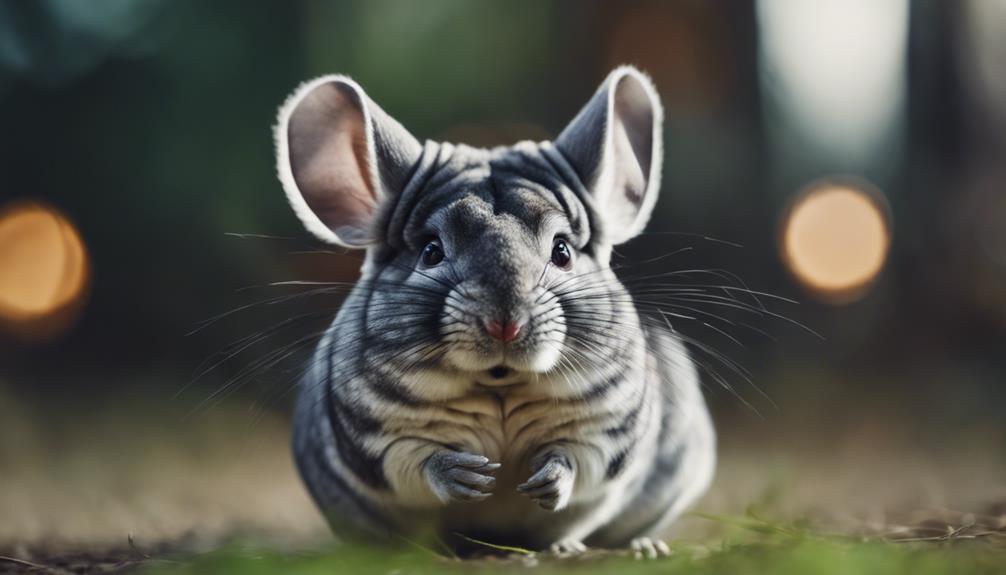
Overgrown teeth in chinchillas can lead to serious health issues if not promptly addressed by a veterinarian. Chinchillas have open-rooted teeth that continuously grow throughout their lives. When these teeth become overgrown, it can cause pain, difficulty eating, and potentially lead to more severe problems if left untreated.
Here are some key points to consider regarding overgrown teeth in chinchillas:
- Regular Dental Exams: Routine dental exams by a veterinarian can help detect overgrown teeth early on before they escalate into more significant issues.
- Tooth Trimming Techniques: Veterinarians may use specialized tools to trim chinchillas' teeth to a proper length, ensuring they can eat and groom comfortably.
- Preventative Care: Providing your chinchilla with appropriate chew toys and a balanced diet can help naturally wear down their teeth and prevent overgrowth.
Frequently Asked Questions
Can Dental Problems in Chinchillas Cause Bad Breath?
Yes, dental problems in chinchillas can cause bad breath. Proper dental hygiene and a balanced diet are crucial for their oral health. Regular grooming and monitoring for signs of dental issues can help prevent bad breath and other complications.
Are There Any Specific Toys or Treats That Can Help Prevent Dental Issues in Chinchillas?
Chew toys and dental treats can be beneficial for chinchillas by promoting healthy teeth and preventing dental issues. These items help keep their teeth worn down naturally, reducing the risk of potential problems.
How Often Should Chinchillas Have Their Teeth Checked by a Veterinarian?
Regular checkups are crucial for chinchillas' dental health. Preventative care involves having their teeth checked by a veterinarian at least once a year. Early detection of dental problems can help prevent serious issues down the line.
Can Dental Problems in Chinchillas Lead to More Serious Health Issues?
Dental problems in chinchillas can indeed lead to more serious health issues. Poor dental hygiene can affect their overall health. Chinchilla behavior changes may indicate dental issues. Regular vet check-ups help prevent complications and ensure their well-being.
Are There Any Home Remedies or Supplements That Can Help With Chinchilla Dental Health?
Herbal remedies and supplements can aid in chinchilla dental health. Natural toothpaste and chew toys promote good dental hygiene. These proactive measures may help prevent dental problems and contribute to the overall well-being of chinchillas.











